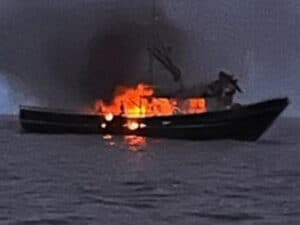
Bridgestone cops plea in marine hose price-fixing case
Written by Nick Blenkey Bridgestone Corporation has agreed to plead guilty and to pay a $28 million criminal fine for its role in conspiracies to rig bids and to make corrupt payments to foreign government officials in Latin America related to the sale of marine hose and other industrial products manufactured by the company and sold throughout the world, according to Acting Assistant Attorney General Sharis A. Pozen of the Department of Justice’s Antitrust Division and Assistant Attorney General Lanny A. Breuer of the Department of Justice’s Criminal Division.
Bridgestone Corporation has agreed to plead guilty and to pay a $28 million criminal fine for its role in conspiracies to rig bids and to make corrupt payments to foreign government officials in Latin America related to the sale of marine hose and other industrial products manufactured by the company and sold throughout the world, according to Acting Assistant Attorney General Sharis A. Pozen of the Department of Justice’s Antitrust Division and Assistant Attorney General Lanny A. Breuer of the Department of Justice’s Criminal Division.
A two-count criminal information was filed today in U.S. District Court in Houston against Bridgestone, a Tokyo-headquartered manufacturer of marine hose and other industrial products, charging the company with conspiring to violate the Sherman Act and the Foreign Corrupt Practices Act (FCPA). According to the court document, Bridgestone conspired to rig bids, fix prices and allocate market shares of marine hose in the United States and elsewhere and, separately, conspired to make corrupt payments to government officials in various Latin American countries to obtain and retain business. The department said Bridgestone participated in the conspiracies from as early as January 1999, and continuing until as late as May 2007.
Under the terms of the plea agreement, which is subject to court approval, Bridgestone has also agreed to cooperate fully in the department’s ongoing investigations.
According to the antitrust charge, Bridgestone and its co-conspirators agreed to allocate shares of the marine hose market and to use a price list for marine hose in order to implement the conspiracy. Bridgestone and its co-conspirators agreed not to compete for one another’s customers either by not submitting prices or bids, or by submitting intentionally high prices or bids to certain customers. As part of the conspiracy, Bridgestone and its co-conspirators provided information received from customers in the United States and elsewhere about upcoming marine hose jobs to a co-conspirator who served as the coordinator of the conspiracy. Bridgestone received marine hose prices for customers in the United States and elsewhere from the coordinator of the conspiracy and then sold the marine hose to those customers at collusive and noncompetitive prices and then concealed the conspiracy through various means, including code names, private email accounts and telephone numbers.
During the bid rigging conspiracy, according to the court document, the cartel affected prices for hundreds of millions of dollars worth of marine hose and related products sold worldwide.
The department also charged that, in order to secure sales of marine hose in Latin America, Bridgestone authorized and approved corrupt payments to foreign government officials employed at state-owned entities. Bridgestone’s local sales agents agreed to pay employees of state-owned customers a percentage of the total value of proposed sales. When Bridgestone secured a sale, it would pay the local sales agent a “commission” consisting of not only the local sales agent’s actual commission but also the corrupt payments to be made to employees of the state-owned customer. The local sales agent then was responsible for passing the agreed-upon corrupt payment to the employees of the customer.
Bridgestone is the fifth company to be charged in the Antitrust Division’s bid rigging investigation. To date, nine individuals have been convicted and sentenced to a total of 4,557 days in prison for their involvement in the marine hose conspiracy, including Misao Hioki, the former general manager of Bridgestone’s international engineered products department, who was sentenced to two years in prison on Dec. 10, 2008. Hioki also pleaded guilty and was sentenced for his role in the FCPA conspiracy.
Bridgestone is charged with conspiring to violate the Sherman Act, which carries a maximum $100 million criminal fine for corporations. Bridgestone is also charged with conspiring to violate the FCPA, which carries a maximum $500,000 fine for corporations. The maximum fine for each count may be increased to twice the gain derived from the crime or twice the loss suffered by the victims of the crime, if either of those amounts is greater than the statutory maximum fine.
Under the plea agreement, the department recognized Bridgestone’s cooperation with the investigations, including conducting a worldwide internal investigation, voluntarily making employees available for interviews, and collecting, analyzing and providing to the department voluminous evidence and information. In addition, the plea agreement acknowledges Bridgestone’s extensive remediation, including restructuring the relevant part of its business, terminating many of its third-party agents and taking remedial actions with respect to employees responsible for many of the corrupt payments. Under the terms of the plea agreement, Bridgestone has committed to continuing to enhance its compliance program and internal controls. As a result of these mitigating factors, the department agreed to recommend a substantially reduced fine.
This case is being prosecuted by the Antitrust Division’s National Criminal Enforcement Section and the Criminal Division’s Fraud Section. In addition to the Antitrust and Criminal Divisions, the ongoing investigation is being conducted by the Defense Criminal Investigative Service (DCIS) of the Department of Defense’s Office of Inspector General, the U.S. Navy Criminal Investigative Service and the FBI. Law enforcement agencies from multiple foreign jurisdictions are also investigating or assisting in the ongoing matter.
September 15, 2011





Leave a Reply
You must be logged in to post a comment.